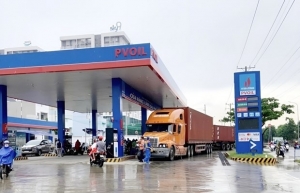Middle East tensions hit inflation goals
 |
| No disuption of petrol supply chains will be tolerated, photo Le Toan |
The Vietnamese government last week requested the State Bank of Vietnam to coordinate with relevant agencies and localities to closely follow global economic developments in order to continue its flexible monetary policy, and to both boost economic growth and control inflation.
Meanwhile, the Ministry of Industry and Trade (MoIT) has been ordered to ensure sufficient electricity and petrol for service production and business activities. There must be no shortages of electricity or disruption of fuel supplies under any circumstances, the ministry added.
The government’s move followed increasingly complicated tensions in the global geopolitical landscape, in particular the escalating Middle East conflict.
The International Monetary Fund has warned that growing conflict in the region risks higher oil prices, a reversal of the recent fall in inflation, and a puncturing of the optimistic mood in financial markets. It is closely monitoring events in the region, and has stressed that even the possibility of a war between Iran and Israel could lead to higher interest rates.
Iranian leaders have reportedly said that it could close the Strait of Hormuz if deemed necessary. The strait connects the Persian Gulf with the Gulf of Oman and the Arabian Sea. According to the US Energy Information Administration (EIA), it is the world’s most important oil choke point because about one-fifth of the volume of the world’s total oil consumption passes through the strait on a daily basis.
In the first half of 2023, its oil flow averaged 21 million barrels per day, or about 21 per cent of global petroleum liquid consumption.
Although Israel is not a major oil producer, its geopolitical significance and the potential for further escalation have made it a focal point in the global oil market. The potential conflict has not only led to rising oil prices due to concerns about supply disruptions, but also triggered apprehensions about geopolitical events affecting global economic indicators.
According to the EIA, per-barrel prices of WTI and Brent Crude reached $86.21 and $90.84 as of late last week – up from $80 and $85 levels, respectively, recorded on March 20. Analysts forecast that if the conflict is expanded, the average oil price may soar past $100 a barrel.
The MoIT reported that in Q1 of 2024, the world’s oil market was strongly impacted by political tensions and the output reduction policy of the Organization of the Petroleum Exporting Countries as well as non-members of the organisation, which pushed up oil prices.
In the Vietnamese market, the first three months of this year saw the average fuel price increase by an average of 10.5-10.8 per cent. Last week, the petrol price exceeded VND25,000 ($1.04) per litre. The MoIT and the Ministry of Finance ascribed the rise to some factors such as Middle East tensions and the Russia-Ukraine conflict.
Vietnam, being heavily contingent on oil imports, faces increased challenges. If global oil prices spike, consumers and enterprises in the country will face prolonged high prices. This could potentially cause a ripple effect on the economy, raising the costs of transportation, goods, and services, thereby fuelling inflation.
Nguyen Hoai Nam, deputy general secretary of the Vietnam Association of Seafood Exporters and Producers, said that the fishery industry is facing massive difficulties including a hike in transportation costs and fuel prices, and this has been burdening enterprises.
“High fuel prices have been putting pressures on shipowners. Each trip offshore to fish would need about VND300 million (over $13,000) for a ship,” Nam said. “Each time the fuel price is increased, the ship’s operational costs will escalate by 20-30 per cent on average as the ship will need fuel, ice to freeze fish, drinking water, and foodstuffs, among many others.”
Also, the augmentation in fuel prices have also caused a 15-20 per cent rise in the transportation costs for automobiles domestically.
Vietnam’s inflation grew 3.77 per cent on-year in Q1 2024, and the government is expecting to rein in the rate at below 4.5 per cent for the whole year. The MoIT has ordered related departments in all localities nationwide to cooperate with authorised agencies to supervise all fuel trading activities about selling time and selling prices.
“No petrol stations are allowed to halt operations without proper reasons. No shortages of petrol and no disruptions of petrol supply chains are allowed to happen in any locality,” said Deputy of Industry and Trade Phan Thi Thang.
According to the MoIT, assorted fuel imported and purchased from domestic sources in Q1 2024 reached 6.5 million cubic metres. The ministry cited both Nghi Son Refinery and Petrochemical LLC and Binh Son Refining and Petrochemical JSC as reporting that in Q1, they produced an estimated volume of 3.7 million tonnes of assorted fuel. It is estimated that the domestic consumption of fuel hit about six million cu.m.
 | Growth ahead for oil and gas businesses Oil and gas companies could cash in on the current oil prices that are forecast to remain high in 2023, which is also an important factor promoting increased investment in the sector. |
 | Price management tweaks urged for petrol retailers Petrol retailers and industry insiders are calling for a change in the state management of fuel to ensure businesses can stay afloat. |
 | Oil slumps on easing fears of Mideast regional war World oil prices sank Monday as traders hoped a region-wide conflict could still be avoided and Israel said its forces killed dozens of Hamas militants in clashes in Gaza. |
 | Oil prices jump, stocks slump after Iran blasts Global markets were rattled Wednesday as blasts in Iran that killed at least 103 fanned fears of the war between Israel and Hamas spreading further. |
What the stars mean:
★ Poor ★ ★ Promising ★★★ Good ★★★★ Very good ★★★★★ Exceptional
Related Contents
Latest News
More News
- Tet event in Japan celebrates success of 14th National Party Congress (January 25, 2026 | 10:04)
- 14th National Party Congress wraps up with success (January 25, 2026 | 09:49)
- Congratulations from VFF Central Committee's int’l partners to 14th National Party Congress (January 25, 2026 | 09:46)
- List of newly-elected members of 14th Political Bureau announced (January 23, 2026 | 16:27)
- 14th Party Central Committee unanimously elects To Lam as General Secretary (January 23, 2026 | 16:22)
- List of members of 14th Party Central Committee announced (January 23, 2026 | 09:12)
- Highlights of fourth working day of 14th National Party Congress (January 23, 2026 | 09:06)
- Press provides timely, accurate coverage of 14th National Party Congress (January 22, 2026 | 09:49)
- Press release on second working day of 14th National Party Congress (January 22, 2026 | 09:19)
- Minister sets out key directions to promote intrinsic strength of Vietnamese culture (January 22, 2026 | 09:16)

 Tag:
Tag:




















 Mobile Version
Mobile Version